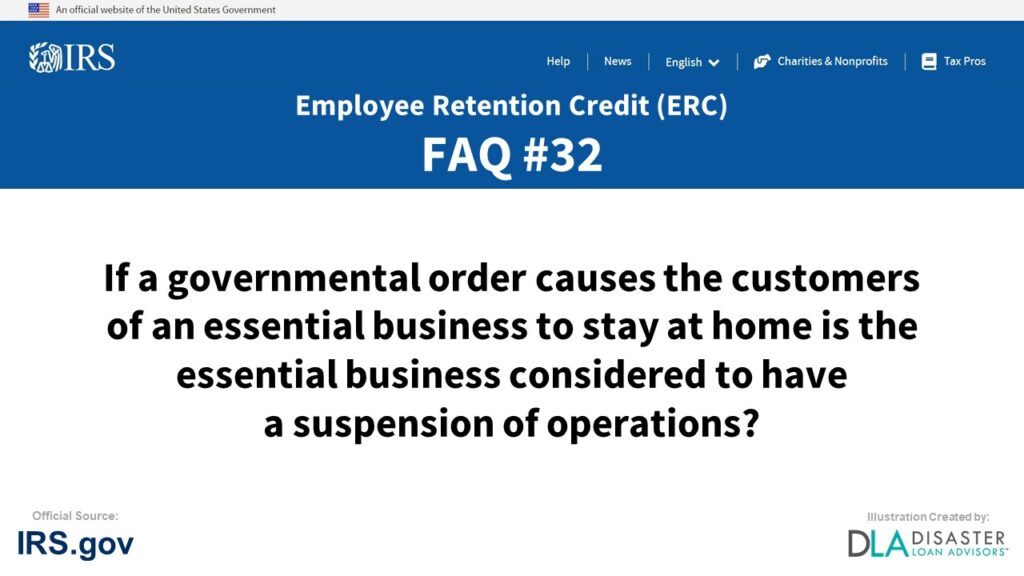
Frequently asked question #32 “If a governmental order causes the customers of an essential business to stay at home is the essential business considered to have a suspension of operations?” under the Determining When an Employer’s Trade or Business Operations are Considered to be Fully or Partially Suspended Due to a Governmental Order section of FAQs: Employee Retention Credit under the CARES Act, provided by the IRS.gov to help business owners understand the ERC program. Information is below for the question #32 If a governmental order causes the customers of an essential business to stay at home is the essential business considered to have a suspension of operations?
ERC Credit Frequently Asked Question #32:
COVID-19-Related Employee Retention Credits:
Determining When an Employer’s Trade or Business Operations are Considered to be Fully or Partially Suspended Due to a Governmental Order FAQs
32. If a governmental order causes the customers of an essential business to stay at home is the essential business considered to have a suspension of operations?
No. An employer that operates an essential business that is not required to close its physical locations or otherwise suspend its operations is not considered to have a full or partial suspension of its operations for the sole reason that its customers are subject to a government order requiring them to stay at home.
The employer may be considered an Eligible Employer and may be eligible for the Employee Retention Credit if it experiences a significant decline in gross receipts. For more information on what constitutes a significant decline in gross receipts, see Determining When an Employer is Considered to have a Significant Decline in Gross Receipts.
Example: Employer B, an automobile repair service business, is an essential business and is not required to close its locations or suspend its operations.
Due to a governmental order that limits travel and requires members of the community to stay at home except for certain essential travel, such as going to the grocery store, Employer B’s business has declined significantly.
Employer B is not considered to have a full or partial suspension of operations due to a governmental order. However, Employer B may be considered an Eligible Employer if it has a significant decline in gross receipts.
For more Internal Revenue Service (IRS) Department of the Treasury Employee Retention Credit (ERC) Determining When an Employer’s Trade or Business Operations are Considered to be Fully or Partially Suspended Due to a Governmental Order FAQs, visit the official IRS.gov tax website.
Conclusion and Summary on ERC Credit FAQ #32. If a governmental order causes the customers of an essential business to stay at home is the essential business considered to have a suspension of operations?
The “If a governmental order causes the customers of an essential business to stay at home is the essential business considered to have a suspension of operations?” is Frequently Asked Question #32 of many commonly asked questions small business owners are wondering about how to file the Employee Retention Tax Credit (ERTC). The IRS ERC Tax Credit program is a confusing and complex process to determine the correct ERC calculations your business qualifies for. Answers to “If a governmental order causes the customers of an essential business to stay at home is the essential business considered to have a suspension of operations?” and filling out form 941-X may change slightly from frequently updated rules and regulations from the IRS. Leave a comment below if you have further questions on ERC Credit FAQ #32.
Help Completing / Filing / Claiming the Employee Retention Credit (ERC)
Receive Up to a $26,000 ERC Credit from the IRS Per Employee
Disaster Loan Advisors can assist your business with the complex and confusing Employee Retention Credit (ERC), Form 941-X, and the Employee Retention Tax Credit (ERTC) program.
Depending on eligibility, business owners and companies can receive up to $26,000 per employee based on the number of W2 employees you had on the payroll in 2020 and 2021.
The ERC / ERTC Tax Credit Program is a valuable IRS tax credit you can claim. This is money you have already paid to the IRS in payroll taxes for your W2 employees.
We DO NOT charge a percentage (%) of your ERC Refund like some companies are charging. Some ERC firms out there are charging upwards of 15% to 35% of your ERC refund!
Our professional ERC fee and pricing structure is very reasonable in comparison.
If you are looking for an ERC Company that believes in providing professional ERC Services and value, in exchange for a fair, reasonable, and ethical fee for the amount of work required, Disaster Loan Advisors is a good fit for you.
Schedule Your Free Employee Retention Credit Consultation to see what amount of employee retention tax credit your company qualifies for.
Cover Image Credit: Irs.gov / ERC FAQ / Disaster Loan Advisors.
